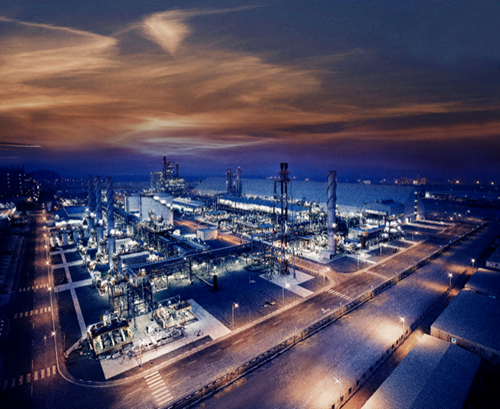News
ADNOC sends first low-carbon ammonia shipment from the UAE to Germany
Abu Dhabi National Oil Company (ADNOC) announced its first shipment of low-carbon ammonia has left the United Arab Emirates (UAE) bound for Hamburg, Germany. This is the first ever cargo of low-carbon ammonia to be shipped to Germany.

The demonstration cargo will be delivered to Aurubis, a leading global provider of non-ferrous metals and one of the largest copper recyclers worldwide, that has its headquarters in Hamburg. On arrival in Germany, Hamburger Hafen und Logistik AG (HHLA), one of Europe’s leading logistics companies will handle the cargo.
Produced by Fertiglobe, a partnership between ADNOC and OCI, at its Fertil plant in Abu Dhabi’s Ruwais industrial complex, the demonstration cargo is the first of several test cargoes sold to customers in Germany as ADNOC expands its strategic energy partnership across the H2 value chain. The cargo follows several similar low-carbon ammonia sales that have been made to customers in Asia. Aurubis plans to utilize the low-carbon ammonia as a feedstock in its wire rod plant, testing its application as an additional, lower-carbon energy source for industrial utilization. The H2 it contains has the potential to be a low-carbon energy alternative for the energy-intensive processes in multi-metal production.
This is another important milestone in the planned scale-up of H2 and low-carbon ammonia production capabilities in Abu Dhabi, where ADNOC is developing a new world-scale 1-MMtpy low-carbon ammonia plant at TA’ZIZ, the chemicals, industrial services and logistics hub in the Ruwais Industrial Complex.
His Excellency Dr. Sultan Ahmed Al Jaber, UAE Minister of Industry and Advanced Technology and ADNOC Managing Director and Group CEO said, “This demonstration cargo of low-carbon ammonia builds upon the longstanding bilateral relationship between the UAE and Germany and our growing partnership in clean energy. It highlights ADNOC’s expanding role as a trusted exporter of low-carbon fuels, as the UAE focuses on the industrial growth opportunities within the energy transition.
“Our collaboration with customers in Germany also underlines ADNOC’s ambitious growth plans to produce clean hydrogen, and its carrier fuels such as ammonia, which will play a critical role in decarbonizing hard-to-abate industrial sectors. We are committed to accelerating and deepening private and public sector collaboration in clean hydrogen projects that will reduce carbon emissions and the carbon intensity of the energy that supports our everyday lives.”
Roland Harings, CEO of Aurubis said, “As the most efficient and sustainable smelter network in the world, Aurubis provides metals that are key for megatrends such as renewable energies, electric mobility and digitalization and hence for decarbonization. To guarantee stable processes at our sites, we are expanding our portfolio of reliable energy sources and thus investing in the decarbonization of our production at the same time. This first trial shipment of low-carbon ammonia from ADNOC represents an important milestone in our long-term vision for hydrogen solutions that will help meet our decarbonization goals.”
Angela Titzrath, CEO of HHLA said, “With its experience in port handling and logistic of containerized dangerous goods, its vast network of seaport terminals, hinterland connections and intermodal hubs across Europe, HHLA is pleased to facilitate the import of hydrogen and its derivates to Germany and Europe as part of the strategic energy partnership.”
H.E. Michael Westhagemann, Hamburg Senator for Economy and Innovation said, “I very much welcome the fact that our international and national partners in business and the port are leading the way with these real-world trials for decarbonizing industry. We need these real-world findings and commitment to support the ramp-up of a Green Hydrogen Economy. Hamburg as an industrial location and as a European distribution port is a blueprint for this transformation and is therefore also in the German focus.”
During the visit of H.E. Dr. Robert Habeck, Germany’s Vice Chancellor and Federal Minister for Economic Affairs and Climate Action to the UAE in March 2021, ADNOC signed agreements with several German companies to explore opportunities for collaboration in low-carbon and renewable H2 derivatives.
Building on its position as an early mover in the production of H2, ADNOC plans to significantly grow its H2 production in support of the UAE’s ambition to supply up to 25% of imported H2 in key global markets. Germany’s national H2 strategy expects an import demand for clean H2 of approximately 3 MMtpy by 2030 and up to 15 MMtpy by 2050 when, according to research from the Hydrogen Council, H2 could meet up to 18% of the world’s energy demand.
Low-carbon ammonia is the most promising at-scale H2 carrier and potential clean fuel for a wide range of applications, including transportation, power generation and industrial, including steel, cement and fertilizer production. It is made from nitrogen and clean H2 derived from natural gas feedstocks, with the CO2 by-product from H2 production captured and stored.

